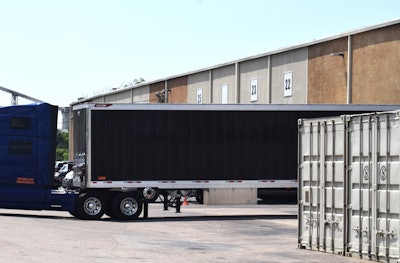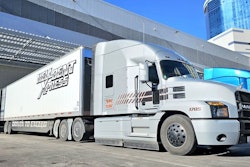
Truck driver detention at customer facilities cost the trucking industry $15 billion in 2023, according to new research released by the American Transportation Research Institute (ATRI).
ATRI’s report released Sept. 10 puts numbers on the consequences of detention when it comes to productivity and safety. The research quantifies the direct costs for fleets, truck drivers and supply chains in general. It also corroborates previous research that detained trucks drive faster both after, and before, a detained trip occurs.
While any time spent at a customer facility in which a driver is waiting for active operations to commence or resume is operationally considered detention, ATRI’s research follows a standard industry definition of detention as any dwell time longer than 2 hours.
All told, based on industry-reported data, truck drivers were detained between 117 and 209 hours per year, depending on the sector. In for-hire trucking alone, the total time lost to truck driver detention exceeded an estimated 135 million hours in 2023.
While 94.5% of fleets charge detention fees, they are paid for fewer than half of those invoices. As a result, the trucking industry lost $3.6 billion in direct expenses and $11.5 billion in lost productivity from driver detention in 2023.

[Related: 'Way past ridiculous': Owner-ops sound off on FMCSA's baby steps on detention]
ATRI found that driver detention has decreased slightly in the last few years, with the frequency of stops including detention time dropping by 6.5 percentage points between 2014 and 2023.
ATRI also found that significant detention of two hours or more became considerably less common, dropping by 11.4 percentage points between 2014 and 2023.
Even with these improvements, drivers experienced detention on 39.3% of stops in 2023. In 9.9% of stops -- one in every ten -- drivers experienced more than two hours of detention.
 ATRI's research found that instances of detention time beyond two hours has decreased over the last decade, while stops with detention of fewer than 2 hours have increased.ATRI
ATRI's research found that instances of detention time beyond two hours has decreased over the last decade, while stops with detention of fewer than 2 hours have increased.ATRI
Drivers pulling reefer trailers experienced the most detention time, ATRI found, with detention occurring in an average of 56.2% of stops in 2023. Truckload dry van drivers experienced detention in an average of 32.6% of stops, while flatbed drivers experienced detention in an average of 26.2% of stops. Specialized operators saw just 19.3% of stops come with detention.
 Notably, company drivers had the lowest percentage of stops with detention. Owner-operators with their own authority had the highest percentage of stops with detention between zero and two hours.ATRI
Notably, company drivers had the lowest percentage of stops with detention. Owner-operators with their own authority had the highest percentage of stops with detention between zero and two hours.ATRI
ATRI determined that owner-operators experience detention more often than company drivers because, often, spot market freight came with extended waits well more often than contract freight. In a motor carrier survey, respondents reported that 33.8% of stops associated with contract freight experienced detention, compared with 42.5% of stops associated with spot market freight.
Of course, detention also impacts drivers’ hours of service, as well as future load/unloads. In truckload, 57.8% of drivers reported they were late to or had to cancel a pick-up or delivery due to detention at the previous customer’s facility at least once in 2023. Fifty-two percent of truckload drivers also reported running out of hours at a customer facility because of detention.
ATRI also highlighted other work challenges caused by detention. Drivers reported that an average of 50% of customer facilities do not allow drivers to park in the facility while waiting to load or unload. Additionally, drivers reported that 44% of customer facilities do not allow drivers to use bathroom facilities of any kind while waiting.
[Related: FMCSA reassesses 'detention' definition in latest study]
ATRI’s large truck GPS data at different customer facility types showed that detention contributes to higher truck speeds.
 Trucks that were detained drove 14.6% faster on average than trucks that were not detained. Interestingly, trucks also drove faster on trips to facilities where they were detained, indicating that truck drivers know which firms and facilities will likely detain them.ATRI
Trucks that were detained drove 14.6% faster on average than trucks that were not detained. Interestingly, trucks also drove faster on trips to facilities where they were detained, indicating that truck drivers know which firms and facilities will likely detain them.ATRI
As part of the survey, respondents were asked to share any successful strategies that they have used to reduce detention. Those include:
- Negotiate detention fees, when possible
- Arrive early
- Utilize trailer-based approaches, such as drop-and-hook or “no touch” shipments
- Communicate with customers
- Refuse service with customers that persistently cause detention and remain apathetic toward addressing it
Read more about the strategies, as well as all of ATRI’s findings, in the full report here.
[Related: How to turn up the heat on detention]










